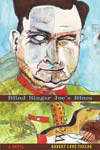 Blind Singer Joe’s Blues
Blind Singer Joe’s BluesBy Robert Love Taylor
Southern Methodist University Press
0-87074-511-5
Blues and folk music share some deep ancestral ties. The great Library of Congress field recorder Alan Lomax certainly understood the connection. In his novel Blind Singer Joe’s Blues, Robert Love Taylor illustrates that relationship in a story of deeply tangled family roots.
Set in the border towns of Tennessee and Virginia, Taylor’s novel tells the early family history of a blues and jazz oriented guitarist and vocalist, Singer Joe Crider. (Knowing that his given name is Singer Joe, who is indeed blind, actually makes the title sound less awkward.) He is the product of an unfortunate union, one of two that produce sons for his mother. In each case, the father enters her life as a somewhat sinister figure, but becomes ever more pathetic as the story unfolds. It is the third man of her life, fiddler Pink Miracle that serves as a moral center for the story.
The Crider and Bayless families live a hardscrabble existence. Domestic service, running moonshine, and handling snakes are parts of everyday life for them. In an often grim and naturalistic book, Taylor does not scorn his characters for being hicks, but he spares them none of life’s hardships.
The blues is central to Blind Singer, but rarely seen or heard. It is simultaneously the music of escape and belonging. Both Singer Joe Crider and Pink Miracle, estranged from their immediate families, find acceptance in the world of African-American blues, despite their white country backgrounds. In the blues, Miracle once found a surrogate father-figure in blues musician Sonny Boy Jimson, and his own niche on fabled Beale Street, where he could:
“feel like a king, because of the music, the musicians playing with him, almost all of them black, sons of slaves, blues in their blood, leading him, a white boy from Oklahoma, into the music, making him play his way into and then out of feelings he didn’t even know he had.” (p. 74)
Later, Crider’s mother would run-off with Miracle, forming a country family-band. Crider would eventually find his own musical acceptance in the Deep Ellum section of Dallas, where:
“once Charlie Christian—before he signed on with Benny Goodman—looked him up and traded licks with him, and Bob Wills came around, puffing cigar smoke, asking him to play this or that, but nothing came of it, and he didn’t care to play with those Texas Playboys anyway, that country-boy jazz. That was Pink Miracle’s music, not his.” (p. 215)
Taylor is an excellent writer. He handles shifts in time and interludes of dream and delirium with great skill. His ear for dialogue and dialect is also quite impressive. Blind Singer effectively conveys the people and locales of Appalachia and the American Southwest. It might not be a satisfying read for those who worship the devil blues of Robert Johnson and Peatey Wheatstraw, and are looking for blues novels that essentially rewrite their legends. Taylor however, has written a compelling family drama that evokes a Southern Gothic atmosphere of “hants” and haunted places, which in reality are just the desperate people and mean circumstances which produced Singer Joe Crider.